New modified rehabilitation regime for internally fixed metacarpal fractures
Metacarpal fractures account for 40% of all hand injuries and up to 44% of all hand fractures. While we are still collecting and processed data, preliminary results are suggesting that splint is neither needed, nor beneficial for patients who have undergone uncomplicated, rigid, internal fixation of metacarpal fractures.
June 2022
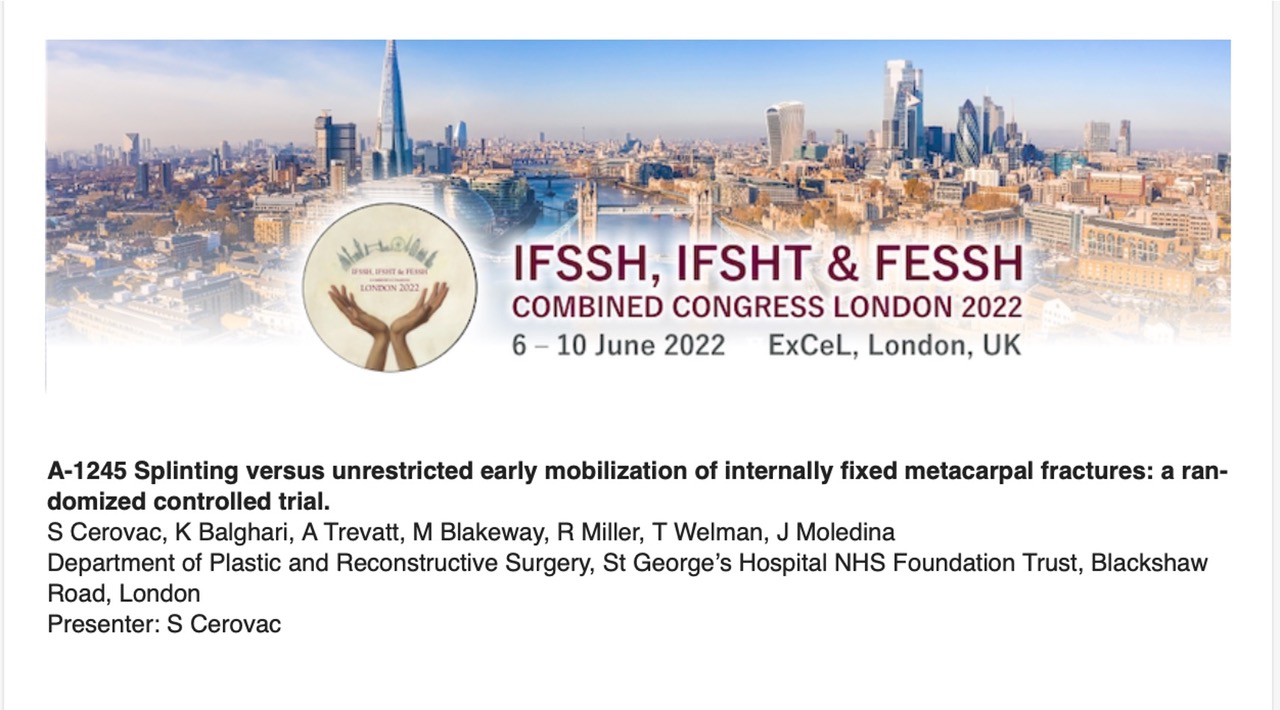
My team presented results of our latest prospective randomised control trial at the IFSSH, IFSHT & FESSH Combined Congress in London last week. Whilst we continue with the painstaking data collection, started few years ago, some conclusive results are starting to emerge.
We wanted to test the widely practiced, conventional rehabilitation regime of splintage of patients with metacarpal fractures, even after uneventful and rigid surgical fixation with internal metalwork (Open Reduction Internal Fixation – ORIF method, see examples below). Study has been ethically approved and we have so far analysed data from over 30 cases.
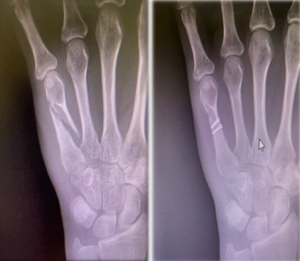
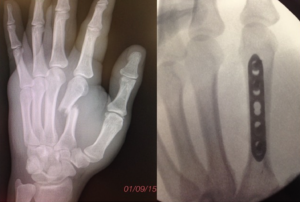
Patients have been prospectively randomised into 2 groups:
– Group A – splinted cohort with operated hand being protected with conventional volar resting splint in position of functional safety for minimum of 2 weeks (Picture, left), and
– Group B – control cohort of patients in whom no splint has been used and patients were encouraged to move fingers and wrist unrestrictedly after surgery (except for sport activities and heavy manual work), (Picture, right).
A 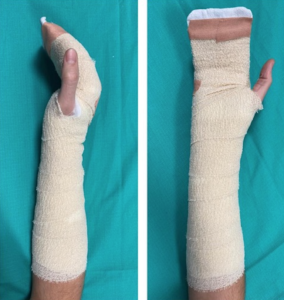 B
B 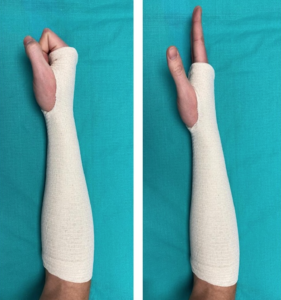
Functional outcome measures (grip strength testing, DASH), pain scores and active range of motion (AROM) were collected at 1, 2 ,4, and 12 weeks post-surgery. The results are showing that, if metacarpal fragments have been fixed in a predictably robust (ORIF) way, splint and immobilisation are not necessary. Our control, Group B that did not use splint, achieved comfortable and pain free recovery, better range of movement, returned to work 9.5 days earlier, and was able to drive 12 days earlier than the immobilised Group A.
Fine and light, but modern and strong plates and screws designed for hand fractures, allow early bone loading and hand mobilisation, which prevents stiffness. Given the additional cost, follow up appointments and prolonged stiffness associated with hand splintage, we recommend that no splint is used in patients who have undergone uncomplicated, rigid fixation of metacarpal fractures.
RECENTLY PUBLISHED
Leave from April 2024
I am on a professional leave from the UK from April 2024 and unable to handle patients queries. If you need any advice, please feel free to consult one of my Plastic Surgery or Orthopaedics colleagues at Parkside, Spire St Anthony’s, Ashtead or King Edward Hospitals. Details of my new overseas practice will be posted shortly.
Joint replacement surgery for thumb arthritis – practice modifications
Our department recently commenced a prospective audit on use of two component carpo-metacarpal prosthesis, in management of thumb basal joint arthrosis. Thumb osteoarthritis is a common condition and many patients are in need of surgical input in order to alleviate disability. Immediate and 6 months post surgery results presented below, are encouraging, but monitoring continues.
New modified rehabilitation regime for internally fixed metacarpal fractures
Metacarpal fractures account for 40% of all hand injuries and up to 44% of all hand fractures. While we are still collecting and processed data, preliminary results are suggesting that splint is neither needed, nor beneficial for patients who have undergone uncomplicated, rigid, internal fixation of metacarpal fractures.
Ten year study on use of special implants for thumb arthritis published in JHS
In my practice, interposition arthroplasty using pyrocarbon implants still represents a useful and reliable treatment option in the surgical treatment of early thumb basal joint arthritis.
Contact
All enquiries are handled
by the Practice Manager:
Rachel Gould
Tel: +44 (0) 845 026 7776
Email: contact@sonjacerovac.com
Correspondence address:
Miss Sonja Cerovac
Ashtead Hospital
The Warren
Ashtead, Surrey KT21 2SB
